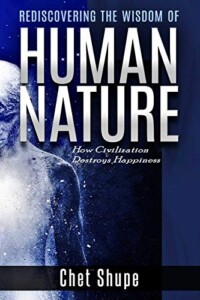Title: Rediscovering the Wisdom of Human Nature: How Civilization Destroys Happiness
Author: Chet Shupe
Publisher: BookBaby
ASIN: B087QL42CH
Pages: 206
Genre: History / Philosophy
Reviewed by: David Allen
Pacific Book Review
The April 2, 2023 New York Times carried a leading story on the death of Bradford Boobis, “Painter, Would-Be Cult Leader and Mystery.” The back story is fascinating. “Boobis was a towering figure,” the obit reads. “A colorful eccentric and minor celebrity.” Boobis was handsome, charismatic and super creative. Among his other feats, he ran a NYC-based cult based on adoration and worship of the works of man.
Chet Shupe, author of the remarkable Rediscovering the Wisdom of Human Nature: How Civilization Destroys Happiness, would surely have been interested. For Shupe as well, civilization and all its adjuncts — technology, materialism, fast food, you get the picture — have almost hopelessly crippled us. As a species, we are grievously out of touch with our feelings which after all are the very best part of ourselves. Shupe is the latter-day Luddite, armed to the teeth with wit and wisdom and irrefutable argument to the effect that as a civilization we are running ourselves down. Even more to his credit, Chet Shupe heaps blame on thousands of years of macho-freighted narrative and His-tory. The fact is — and Shupe’s dialectic on this is insurmountable — sisterhood, the company and society of women, contains the sensitivity, wholeness and vision to ensure the happy perpetuation of the race. Shupe’s feminism is Gaiaism if you will — One Worldism — and probably holds the direction for the survival and even blossoming of future generations. Ah. The ‘F’ word: ‘future.’
Shupe most convincingly demonstrates that the macro-forces of evolution have led us astray, with hypertrophy of the planning-for-the-future-acorns-for-the-winter part of the brain, and a corresponding reduction in volume of the compassion, caring and empathy parts. Not to despair. Language-based diversions from the here and now (= worry, angst, unending concern for the future) can and will give way to spontaneity and warm fellow-feeling once these atavistic holdovers are appropriately consigned to an inferior role.
Which is exactly where Chet Shupe’s book fits in. Evolutionary biologist E.O. Wilson is cited for saying (I paraphrase), “Man’s cognitive set is primitive; his belief systems medieval; but his technology is godly.” Shupe would have to agree. What would he have to say about Oppenheimer? Because the author of this terrific broadside, Chet Shupe, arguing for restoration of some original untarnished version of sanity and thoughtfulness, gives readers an eye-opening and hopeful thought remedy for the future.


